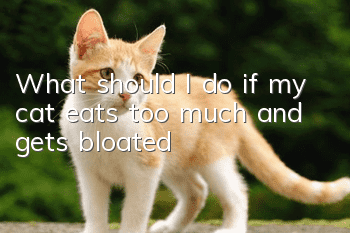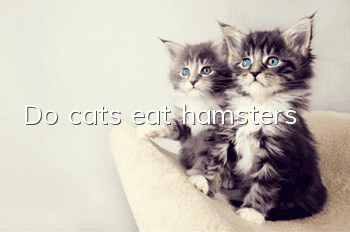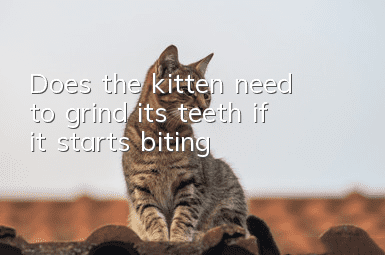What should I do if my cat eats too much and gets bloated?

Methods to treat bloating in cats after eating too much:
1. Pay attention to the cat’s diet
Cat food may cause bloating in cats. Because some cat feeds contain soybeans, when the cat's intestines cannot digest them, the bacteria in the intestines will ferment these indigestible substances and produce gas, causing abdominal distension. The cat's food must be replaced in time. When the cat's stomach is bloated, try to feed it easy-to-digest liquid food, such as millet porridge, to see if the cat has an appetite.
2. Probiotics regulate the gastrointestinal tract
To relieve cat bloating and loss of appetite, the most important thing is to target the cat’s gastrointestinal tract. To adjust the cat’s gastrointestinal tract and promote appetite, the cat needs to take probiotics to strengthen the stomach. Eliminate food, improve picky eaters and partial eclipses, and enhance cats’ appetite. You can mix probiotics into the cat's food, or feed it with honey water or yogurt. Not only does the cat like to drink it to appetize, but it is also more convenient to feed.
3. Pay attention to details in daily feeding
In daily life, try not to feed cats food that is eaten by humans. Not only is it easy to cause cats to be picky eaters and lose their appetite, but it is also dangerous to feed cats The meat must be processed, with less salt and oil. Ingenious owners can also make some homemade fruit and vegetable food for their cats to eat. They also need to pay attention to the rules when feeding cats, 2-3 meals a day, and eat 70-80% full after each meal. Take food away to prevent the cat from overeating and suffering from indigestion and loss of appetite.
Cat diet precautions:
1. Cats cannot be vegetarian. Cats do not have the ability to convert or synthesize certain key amino acids and vitamins in plants. Several health problems have been associated with cats on a vegan diet, and nutritional deficiencies can lead to serious and even fatal health problems, including heart failure, neurological abnormalities, and blindness.
2. Eat small meals often. Cats’ true eating small meals not only means eating a few mouthfuls at a time and several times a day, but also means tasting more different foods. In fact, this is very beneficial to the cat's health. It not only prevents the cat from accumulating food, but also allows the cat to obtain as many nutrients as possible through a limited amount of food.
3. Cats cannot drink milk. The reason is that milk contains lactose, and cats are lactose intolerant, which means they cannot digest lactose, causing severe diarrhea.
4. Cats cannot eat raw fish for a long time. First of all, there are many parasites and bacteria in raw fish. Cats eating raw fish will increase the chance of being infected with these pathogenic microorganisms. Therefore, if the cat eats raw fish, As a habit, be sure to deworm on time. Secondly, raw fish contains a high content of thiamine enzyme, which can decompose vitamin B1 in cats. Long-term consumption may cause vitamin deficiency. So we should not feed raw fish to cats!
5. Cats cannot eat cold food, otherwise it will cause gastrointestinal discomfort. However, cats do not like food that is too hot, so it is best to adjust the food to the right temperature.
6. Don’t eat bones and meat: Cats are not as good at chewing as dogs, and eating them can easily cause intestinal bleeding.
7. Cats love to eat liver, but they must pay attention to the right amount and a long period of time between two times. Excessive amounts can cause vitamin A toxicity and bone problems in cats.
- These behaviors of cats are not acting coquettishly, but asking you for help!
- What should I do if my cat likes to scratch the sofa?
- British shorthair cat feeding requirements
- Why does a cat lick its body like crazy?
- Will cats lose weight if their teeth are unhealthy? The reason why pet cats are getting thinner and thinner!
- What do kittens like to do in the sun during the day?
- Why does a cat pant so quickly?
- Do all cat lovers know these diseases about cats?
- What foods are suitable for point color short hair cats?
- How to solve the problem of cats "peeing" in spring



